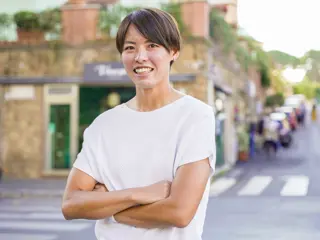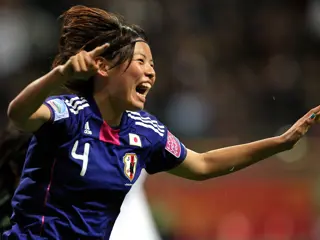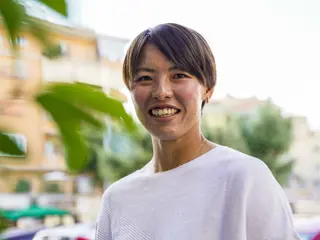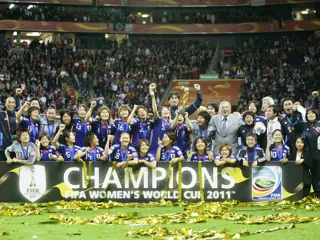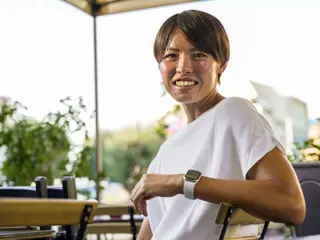Player Story
Saki Kumagai: "There’s no going back"
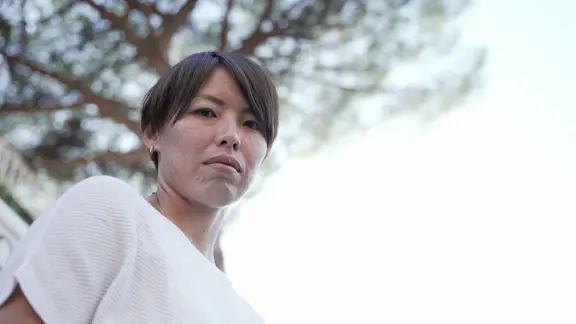
Saki Kumagai
Japan defender Saki Kumagai, a veteran of four Women's World Cups and a 2011 world champion, talks about the evolution of improved conditions for women's internationals at the global finals.
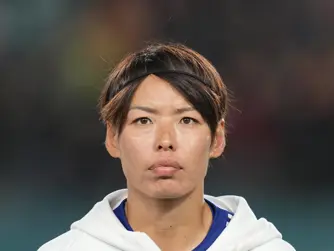
When Japan won the 2011 Women’s World Cup, we received a bonus of 10,000 yen per player for every game we won.
Ten thousand yen. That was around 88 euro in 2011.
Back then, the idea of ever calling myself a professional seemed a faraway dream. I was still a student. Most of the national team either worked during the day and trained at night or, like me, were in education.
We were an amateur outfit in all but name.
In truth, as a group of players, we lacked understanding when it came to player earnings. It’s partly connected to our Japanese culture. We aren’t used to talking about money. It’s a difficult topic to raise.
There had been no discussion about prize money ahead of the competition, and we didn’t have an environment that welcomed questions on such subjects. We honestly didn’t know that we could speak up.
As a 20-year-old, I was just excited to be selected. Why would I jeopardise that? Making that team and appearing at a global event was a lifelong obsession of mine.
It had been my wish since I was a child, kicking a ball about with my older brother. I lived football day and night. It was all I thought about.
In both elementary and middle school, I wrote in my graduation essays that I wanted to be a professional footballer. You can guess my teachers’ reactions. Despite there being almost no women’s pros in Japan at that time, I fantasised about making a full-time career.
I could never have predicted how it would all turn out though. That one day I would score a World Cup-winning penalty.
How I’d love to see my younger self react to that. I still can’t believe it now.
In all honesty, I wasn’t very good at penalties. I had no idea I’d be selected to take one. But when extra time was over in the final and we returned to the bench, Nori-san (Norio Sasaki), our manager, had already decided the order. I was fifth. Imagine my surprise. The biggest match in Japan’s history and I’m picked for the crucial fifth kick. I was so nervous.
Our captain Sawa-san (Homare Sawa) was fourth. However, she said she didn’t want to take one. She moved the magnet with her name to the bottom of the board, and the rest of us moved up one spot.
I was now taking the fourth penalty. My stomach twisted. Lined up on the halfway line, I just kept thinking, “why me?”
You’ve got to remember I was really young. I didn’t want to let the team down.
My team-mates could see I was anxious. Miyama-san (Aya Miyama) and a few others said: “Taking a penalty at a World Cup final is a once in a lifetime opportunity. Let’s enjoy it.”
Those words really saved me. I’m sure Miyama-san and the rest were as nervous as I was and felt the pressure as well, but they didn’t let it show. In that moment, I was able to switch gear and focus. Looking back, that’s what encouraged me to step up and score the deciding penalty.
The delight afterwards is a feeling I’ll never forget. We’d overcome so much to reach that point. We won the World Cup against the odds, both on and off the pitch.
You see, the conditions back then were limited, to say the least. We won the tournament in spite of them.
We flew economy everywhere. We slept in twin rooms. We didn’t have many physios to provide treatment. And the food was whatever was on offer where we were staying.
At the time, we accepted that as the standard. We knew nothing else. It was only after I started playing overseas that I learnt how important it was to speak up.
My game has always been about the collective. I know my strengths, and my limitations. I’m not a player that can dribble past opponents at speed. Or score loads of goals. I can’t do everything on my own. What I can do is get the most out of my team-mates.
The joy of working and achieving together is much better than doing it alone. I prioritise the group because this is the best way to get results. Football is a team game after all.
So when the idea of Japanese women’s footballers joining the union was raised three years ago, I signed up straight away. We spoke to them about what we thought could be improved and they represented us players in a meeting with the Japan Football Association.
I’m a firm believer that we need to do things the ‘Japanese way’. Globally there is a lot of discussion around equal pay, and while we obviously want to be fairly compensated, more importantly, as players, we want to have the optimum conditions to be able to play at our best.
To the federation’s credit, they listened to us and delivered.
Having played in four World Cups, the conditions in 2023 compared to previous editions were unbelievable. I was really able to focus solely on football
At the 2022 Women’s Asian Cup and 2023 World Cup, we travelled business class with an increased delegation and crucially, as someone who loves food, we had our own chefs. It might seem obvious, but as footballers, our body makes us what we are. If it’s not fuelled properly, we can’t perform. And on a World Cup stage, that’s not acceptable.
On behalf of the squad, I also signed FIFPRO’s letter to FIFA seeking equal World Cup conditions, a pathway to equal prize money, and a guaranteed portion of prize money going directly to the players. It’s hard to underestimate how important prize money is for a lot of the team. The amount we earned playing for six weeks in Australia and New Zealand exceeded the annual salary for many of those playing domestically in Japan.
So, progress has been made. Having played in four World Cups, the conditions in 2023 compared to previous editions were unbelievable. I was really able to focus solely on football. When you look at what we have now, we are so much more privileged and taken care of compared to 2011.
But it can’t stop with this World Cup. From now onwards, we need to make sure that this is the norm. We must continue to speak up. I’m very proud to see the number of youngsters coming through who are not afraid to have their voices heard. What we request might not benefit us immediately, but it will definitely help future players.
That way, in 10 years’ time, football will be unrecognisable to the sport we know now and we will see more young girls aspiring to be women’s football players.

